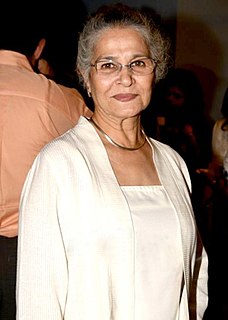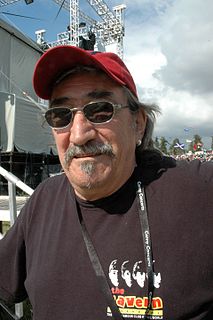A Quote by Sherrilyn Kenyon
As a child, he had hardened his heart and learned to take their punches. He had learned to spit back and take down anyone who cast a jaundiced eye or who made a comment about either him, his mother, or his sister. He’d told himself that he didn’t need anyone’s love or caring. And so he had learned to live like a feral animal, always ready to strike out when someone tried to touch him.
Related Quotes
I would say that I learned that the heartbreak wasn't as much about me as the fact that my partner wasn't right with himself. I see where his life has taken him, and realize that the handwriting was on the wall. There were things that I had blamed myself for, but it was really more about his choices, his needs and his journey as a person. His desire for too much of everything made it a challenging relationship.
The rabbis, the Jewish religious people, the priests of the temple of Jerusalem, they were learned fools. They could not tolerate Jesus. The learned fools are always disturbed by the blessed fools. They had to murder him because his very presence was uncomfortable; his very presence was such a pinnacle of peace, love, compassion and light, that all the learned fools became aware that their whole being was at stake. If this man lived then they were fools, and the only way to get rid of this man was to destroy him so they could. again become the learned people of the race.
Atul had a child from his first marriage but lost him when he was just 16 years old. His wife died 7-8 years later. He's really had a tough life. Probably these experiences have made him a more sensitive, caring and loving person... Had we been 20 years younger, we definitely would have had children.
He thought of trying to explain something he had recently noticed about himself: that if anyone insulted him, or one of his friends, he didn't really mind--or not much, anyway. Whereas if anyone insulted a novel, a story, a poem that he loved, something visceral and volcanic occurred within him. He wasn't sure what this might mean--except perhaps that he had got life and art mixed up, back to front, upside down.
I've learned that whenever I decide something with an open heart, I usually make the right decision. I've learned that even when I have pains, I don't have to be one. I've learned that every day you should reach out and touch someone. People love a warm hug, or just a friendly pat on the back. I've learned that I still have a lot to learn.
He learned to live with the truth. Not to accept it, but to live with it. It was like living with an elephant. His room was tiny, and every morning he had to squeeze around the truth just to get to the bathroom. To reach the armoire to get a pair of underpants he had to crawl under the truth, praying it wouldn't choose that moment to sit on his face. At night, when he closed his eyes, he felt it looming above him.
A man who lies to himself, and believes his own lies becomes unable to recognize truth, either in himself or in anyone else, and he ends up losing respect for himself and for others. When he has no respect for anyone, he can no longer love, and, in order to divert himself, having no love in him, he yields to his impulses, indulges in the lowest forms of pleasure, and behaves in the end like an animal. And it all comes from lying - lying to others and to yourself.
He had tenderness in his heart — ‘a soft place,’ as Nicholas Higgins called it; but he had some pride in concealing it; he kept it very sacred and safe, and was jealous of every circumstance that tried to gain admission. But if he dreaded exposure of his tenderness, he was equally desirous that all men should recognize his justice; and he felt that he had been unjust, in giving so scornful a hearing to anyone who had waited, with humble patience, for five hours, to speak to him.
When Luke had descended into the River Styx, he would've had to focus on something important that would hold him to his mortal life. Otherwise he would've dissolved. I had seen Annabeth, and I had a feeling he had too. He had pictured that scene Hestia showed me—of himself in the good old days with Thalia and Annabeth, when he promised they would be a family. Hurting Annabeth in battle had shocked him into remembering that promise. It had allowed his mortal conscience to take over again, and defeat Kronos. His weak spot—his Achilles heel—had saved us all
He was about to go home, about to return to the place where he had had a family. It was in Godric’s Hollow that, but for Voldemort, he would have grown up and spent every school holiday. He could have invited friends to his house. . . . He might even have had brothers and sisters. . . . It would have been his mother who had made his seventeenth birthday cake. The life he had lost had hardly ever seemed so real to him as at this moment, when he knew he was about to see the place where it had been taken from him.
A magazine editor recently asked me to sit down on my 40th birthday and write an article on the most important things I had learned in my first 40 years. I told him that the chief thing I had learned was that the copybook maxims are true, but that too many people forget this once they go out into the heat and hustle and bustle of the battle of life and only realize their truth once one foot is beginning to slip into the grave. The man who has won millions at the cost of his conscience is a failure.
Photography is unlike any other art form. In the other arts there is always a continuous interplay between the artist and his art. He has the painting or sculpture before him. What we have tried to do is to provide a medium for "artistic expression" to anyone with only a reasonable amount of time. By giving him a camera system with which he need only control his selection of focus, composition and lighting, we free him to select the moment and to criticize immediately what he has done. We enable him to see what else he wants to do on the basis of what he has just learned.






































